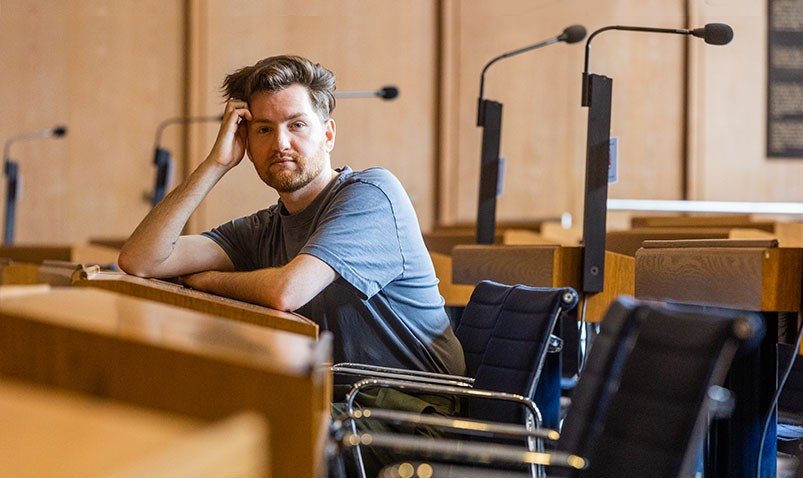Dominik Herold, Visiting Scholar at Columbia Center for Contemporary Critical Thought
Which program/department are you in?
Bernard E. Harcourts Columbia Center for Contemporary Critical Thought.
What is your primary area of research?
Social Philosophy, Critical Theory, Affect Theory and Queer Feminism.
Which country (or countries) do you come from?
Germany (University of Frankfurt).
How long have you been in the U.S.?
For about one month.
Tell us about your research interests.
Currently, I am writing my PhD thesis at the Goethe University in Frankfurt, Germany, about the connection of radical democracy and its affects. I try to show that through the affective dimension within radical democratic theories, the question of power can be analyzed from a broader perspective, insofar as power is understood as affective power in the sense of a collective capacity for agency that shapes bodies, sets them in motion or fixes them, and thus substantially determines the democratic polity. Politics is thus always affective politics - whether one likes it or not. For this, images, symbols, and forms of imagination play just as much a role as modes of interpretation or patterns of experience.
The way in which the affective dimension is dealt with is thus a central task for democracy. Which feelings and emotions are (de)legitimized, which relational connections are recognized or disregarded? Who has what access to his emotions and feelings is thus not a purely private matter, but has always been highly political. In other words, radical democracy cannot exist without affectivity. Whether the affective has a democratic effect in a concrete case or not is not directly stated by this. The affective dimension also remains contested and is permeated by conflicting forces.
Tell us a bit about your projects/studies.
My academic interest is strongly tied back to social practices and an understanding of democracy as a way of life. With my NGOs founded in Germany (“mehr als wählen” and “Netzwerk Paulskirche”) I try to deepen democracy and to create more voice and spaces of participation for those “who do not matter.”
I am convinced that we need diverse places and forms to experience and live democracy.
Anything else you’d like to share about your time in NYC or at Columbia?
I am looking forward to a broad field of seminars, lectures and discussions - also beyond our own disciplinary boundaries. This concerns interdisciplinarity as well as the linking of theory and practice. The many social movements, political struggles, and activist interventions which can be seen here in a condensed form. But also the opportunity to get to know other university cultures and faculties, (for example with the New School for Social Research) and to put these in relation not only to my experiences at Columbia, but also to my previous university locations.
What is the hardest thing about living here?
That almost every drink comes with ice cubes and good cheese costs a fortune.
Connect with Dominik on Instagram, Twitter, LinkedIn, Facebook


Are you (or do you know) an international student, scholar, or alumni?
We’re looking to spotlight stories of academic or professional work, leadership, or personal adjustment to life at Columbia and NY in particular and the U.S. in general.
Submit our nomination form and we'll contact you with the next steps!

